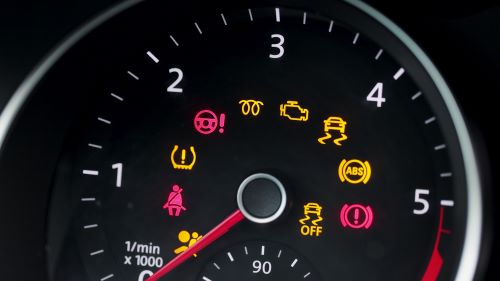
Unsurprisingly, as technology has advanced, it has also advanced the car manufacturing industry. Warning lights are one such technological advancement that helps improve the safety of drivers, passengers, and everyone on the road. These lights come on throughout the lifetime of your car. Some, such as the gas light, are fairly common and may cause you to become accustomed to seeing the light appear on your dashboard. However, some car warning lights are serious and require immediate attention. Keep reading to learn more!
Key Takeaways:
- Each light will pick up a different issue that’s present in your vehicle, so it’s crucial to take note of a dashboard light and tackle repairs before it becomes a dangerous, costly issue.
- Ignoring warning lights could mean you may end up with a huge repair bill, could get stranded, and you’re putting yourself and other road users at risk.
What Do Car Warning Lights Mean?
Your car warning lights are there to let you know how your vehicle is performing. Indicator lights work with advanced technology that’ll give you a warning when something’s wrong. For instance, if your engine is malfunctioning, your vehicle’s diagnostic system and sensors will turn on the check engine light.
Why You Should Never Ignore Car Warning Lights
Besides informing you that there’s something wrong with your car, here are more reasons you shouldn’t ignore car warning lights:
- You Might Get Stranded: Running out of oil or gas or having a flat tire are reasons you might need to make an emergency stop. Your battery or starter dying could lead to you being unable to start your car and being stuck where you are. Most of the time, the warning lights warn you before you’re in a situation that could leave you stranded- so pay attention and seek car maintenance before getting stuck.
- It Could End Up Costing More: While having a warning light on might seem like no big deal, not acting on it can create a much bigger and more costly issue. For instance, you may need to replace car parts sooner if something is causing additional wear, or you could be spending more fuel if you have emissions-related issues.
- Your Safety Could Be at Risk: Braking warning lights, airbag warning lights, and door-ajar lights could be indicators of something potentially fatal if left unchecked. Even ignoring a tire pressure warning light can result in a safety concern if the pressure impacts the stopping power of your car.
Car Warning Lights You Should Never Ignore
Here are warning lights you shouldn’t ignore:
Anti-Lock Brake System (ABS) Warning Lights and Brake Fluid
Brakes are a life-saving component in your car. So ensuring that they’re in good working condition is essential for your safety. For example, if the ABS or warning light is on, it could indicate something wrong with the ABS mechanism. Specifically, it could be a problem with the mechanism that stops the car wheels from getting locked. If you apply brakes in such a condition, it’ll cause the wheels to skid. And if the brake fluid comes up, then it could be a sign of brake pad issues, a low brake fluid level, or a damaged sensor.
Battery/Charging System Car Warning Light
Battery car warning lights indicate that there could be an issue with the car’s electrical system and the battery. Identifying a battery warning label can be easy-most, like a miniature battery. The warning light can mean you have worn battery cables, a bad alternator, or a damaged drive belt- all these things can make your car stall. If the battery warning light comes up while you’re on the road, don’t pull over and cut off the car since it might not restart. Instead, take your car to the nearest service center since you’ll have approximately 15 minutes to drive with your battery light on before your vehicle might stop.
The Coolant Temperature Light
If you notice the coolant temperature light on, it often means the engine’s temperature is very high and more likely dangerous. That can be because of low coolant levels or a leak that’s causing the low levels. When the light comes up, pull over and turn off the engine- that allows the engine to cool. Then, you can top off the coolant to the proper line. If the coolant temperature light turns on often, have a professional inspect your car for a leak. That’s crucial since the engine needs to remain at a normal and safe temperature to function properly.
Oil Pressure Warning Light
Another car warning light you should never ignore is the oil pressure warning light. If this light comes up, it means that the oil pressure or levels are low. You need to pull over and turn off the car immediately to check the oil levels and take it to a car service shop to access the issue further. Running your vehicle on low oil could cause it to stop abruptly and may damage your engine.
Transmission Temperature Warning Light
The transmission temperature warning light indicates that the vehicle’s transmission has reached higher temperatures than usual, and that can cause damage to the car. Therefore, if the light turns on, allowing the car to cool down is crucial. Once cooled, you should check the coolant levels and ensure that your transmission fluid is at the recommended level.
Fix Common Issues Related to Car Warning Lights
There are a lot more warning lights that your vehicle system will give if something goes wrong. The ideal way to properly take care of these issues is to have regular maintenance done to prevent damage and have repairs done as soon as issues are detected. The experts at Empire Hyundai of New Rochelle can help you with maintenance and repair for any issue that your vehicle experiences in its lifetime. If your car warning lights come up, be sure to contact us today!





